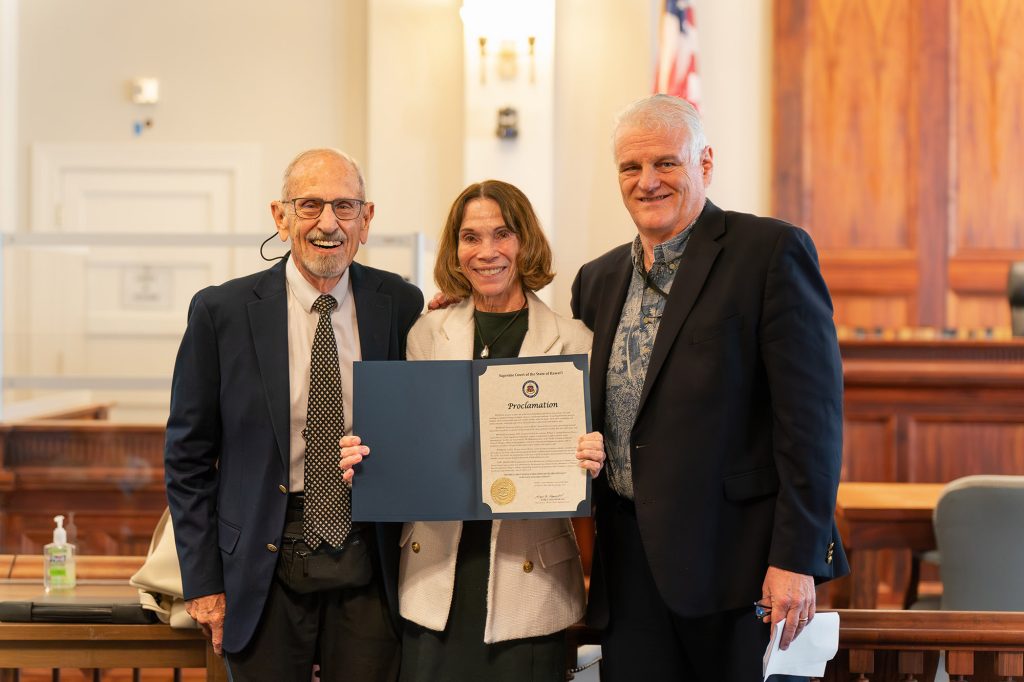Free Divorce Law in Hawaiʻi Program Recognized for Community Impact
Posted on Jul 17, 2025 in Featured News, News & Reports
Family law attorney William C. Darrah and The Mediation Center of the Pacific’s Executive Director Tracey S. Wiltgen receive a proclamation from Chief Justice Mark E. Recktenwald, recognizing them for the many years of support they have given the community through their free Divorce Law in Hawaiʻi program.
HONOLULU – Family law attorney William C. Darrah and The Mediation Center of the Pacific’s Executive Director Tracey S. Wiltgen were honored by Chief Justice Mark E. Recktenwald for having reached a milestone 300th session of the free public education program Divorce Law in Hawaiʻi. Chief Justice Recktenwald presented each with a copy of his proclamation declaring Wednesday, July 16, 2025, to be “Divorce Law in Hawaiʻi 300th Seminar Celebration Day” in the Courts of the State of Hawaiʻi.
“Ninety-four percent of divorce cases in Hawaiʻi have at least one party representing themself, and neither party has an attorney in 62 percent of all cases, primarily because they can’t afford one,” said Chief Justice Recktenwald. “With that many people trying to manage a divorce on their own, there is a great need for this program in our communities.”
“The impact Divorce Law in Hawaiʻi has had is immeasurable,” he explained. “I am so grateful for the 300 presentations and counting, and I want to thank and acknowledge Bill Darrah and Tracey Wiltgen for everything they’ve done for families across our state.”
“Divorce can be really difficult. It’s also a new beginning, unlike any other,” said William Darrah. “For more than 23 years, the Family Court’s Divorce Law in Hawaiʻi free monthly public education program has helped couples get divorced with a minimum of conflict and expense, and move on to whatever life holds next for them. The program has been a valuable resource for Hawaiʻi’s separating and divorcing families. I am thankful to have been a part of it, and I hope that it will go on for many years to come.”
“Thank you so much for this recognition and honor,” said Tracey Wiltgen. “Chief Justice Recktenwald led the charge to increase access to justice across our state and there is so much to do. Divorce Law in Hawaiʻi is just one small way we are able to contribute to that effort.
She noted that, “Every time we present, the feedback from people is they feel a little more powerful. This seminar gives us a chance to provide information on the value of mediation, and how it helps people take control of their lives. We are happy it has made a difference, and look forward to doing more.”
In 2021, due to restrictions on in-person meetings during the COVID-19 pandemic, Divorce Law in Hawaiʻi evolved from an in-person seminar, available only on Oʻahu, to the online videoconference platform Zoom, enabling people to participate from anywhere in the world. As a result, the program has, at the least, tripled the number of participants who join each monthly session. Since the program began in January 2002, it has benefited thousands of individuals at no cost.
The presentations cover all aspects of the divorce process, including legal requirements, custody, property division, and support.
In addition, attendees learn about the value of mediation in divorce, the least costly, least stressful way of working out the terms for couples who cannot do it on their own. The mediation process helps couples learn to talk to each other in a different way, and create customized agreements that meet the unique needs of their family.
Those who wish to learn the nuts and bolts of working through the divorce process and resolve issues while minimizing conflicts may register for upcoming Divorce Law in Hawaiʻi seminars at:
https://www.courts.state.hi.us/self-help/divorce/divorce_law_in_hawaii
Sessions are offered once a month from noon – 1 p.m. on Zoom.
The one-hour sessions include time for questions and answers with Darrah and Wiltgen.
Disclaimer: The Hawaiʻi State Judiciary does not warrant the accuracy or completeness of the information provided by the speakers. The speaker’s remarks do not necessarily reflect the opinions of the Hawaiʻi State Judiciary. The information provided is a general overview of basic legal concepts, and is not intended as legal advice for any specific person or situation.
